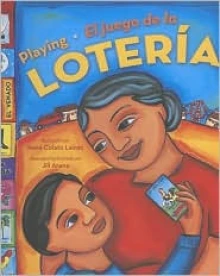
Playing Loteria/El Juego de Lotería by René Colato Laínez & Jill Arena (il.), 9780873589192, Cooper Square Publishing, 2006.
A small boy visits his grandmother in Mexico and uses the game of lotería to facilitate communication.
Playing Lotería/El juego de la lotería
Written by René Colato Laínez
Illustrated by Jill Arena
Luna Rising, 2005, ISBN: 978-0-87358-881-2
In this bilingual picture book, a little boy and his grandmother overcome language issues during a visit together in San Luis de la Paz, Mexico. The grandmother doesn’t speak English and the boy, who is not confident of his ability to speak Spanish, worries about how they will communicate. His mother assures him that “Loved ones have special ways of understanding each other.” In this case, the fifty-four picture cards of lotería, a Mexican version of bingo, prove to be the special way the boy and his grandmother forge bonds of language and love. The grandmother, who runs a lotería booth at a local fair, promises to help the boy with the phrases for calling each card, and he offers to teach her English words in return. As the two spend time together exploring the fair and the local market, they enjoy learning new words and phrases. By the end of his visit, the boy has learned all 54 phrases and has gained confidence in his ability to speak Spanish.
The author’s personal experience as an immigrant to the United States from El Salvador lends weight to the issues of language, immigration, and ethnicity showcased in this charming story. The boy, who lives in the U.S. and is English-dominant while his grandmother remains in Spanish-speaking Mexico, learns through his visit to value his linguistic heritage as he gains knowledge and confidence in the speaking of Spanish. The family’s experience with the erosion of home language ability across generations rings true, as the assimilation into a new country is often accompanied by a loss of the native language. Language difficulties across generations are familiar to many immigrant families. Trips to the home country are common among immigrants today and help strengthen the familial and cultural ties of transnational families.
Each use of this book with students and teachers of Mexican heritage has been received enthusiastically. Readers respond to the close relationship of the boy and his grandmother, the issues of language loss and preservation, and the game of lotería, which they are familiar with from visits to Mexico or in their homes in the United States. Children spill over with personal connections on playing lotería with their families. Readers are also attracted to the colorful illustrations that reflect the bright colors of Mexico, and the numerous depictions of lotería cards that can be found on every page and that form the endpapers.
Readers who are unfamiliar with the cultures depicted in the book will enjoy learning about the game of lotería and will find connections in the trip to visit grandma and the bonds between grandparent and child. While this is a bilingual book, the English text includes many Spanish words and phrases. Most of these can be understood through the context or illustrations, but readers who do not speak Spanish may have some difficulty navigating the text. For monolingual English speakers, this experience may add to their understanding of the story, since a major theme of the book focuses on language issues.
This book would make a good addition to text sets on language issues. It would pair well with a number of different books, including Abuelito Eats with His Fingers by Janice Levy (1999), which is about a young girl who overcomes her initial reluctance to spend a day with her Spanish-speaking grandfather. There are similar themes in Too Young for Yiddish (2002) by Richard Michelson. In this picture book, a grandson learns to appreciate his grandfather’s language and culture.
Janine Schall, University of Texas-Pan American, Edinburg, TX
WOW Review, Volume I, Issue 3 by Worlds of Words is licensed under a Creative Commons Attribution-NonCommercial-ShareAlike 4.0 International License. Based on work at https://wowlit.org/on-line-publications/review/reviewi3.








